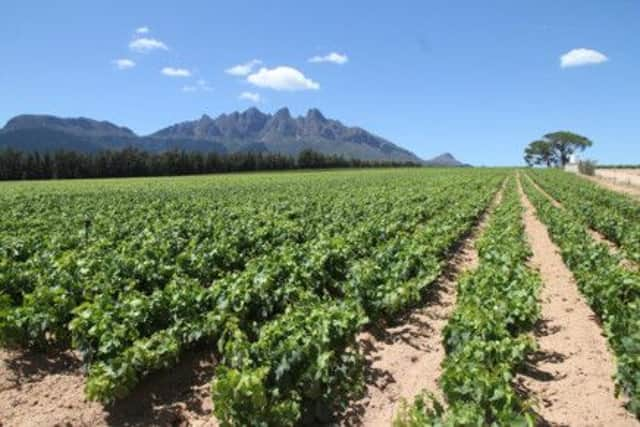Wine Club: A fair way to heaven?


There’s a simple philosophy behind the Bosman Family Vineyards, near Wellington, South Africa: “If you care about the people who do the work, then the people will care about the work they do” It was here that I saw just how far some parts of this beautiful country have come in making their world a fairer, more stable place to live and work.
The Bosman family acquired the Lelienfontein Estate eight generations ago in 1798 and they have farmed it, mainly with vines since then. The first incumbent, Hermanus Bosman was a ‘sieketrooster’, a caregiver, who worked in the Cape and played a central role in community development and social inspiration. He lived by the motto of the family crest ‘faith, hope and love’ and he established many practices at the farm, respecting the harmony of nature, that survive today.
Advertisement
Hide AdAdvertisement
Hide AdFor 150 years the estate flourished, making and selling wine, and in the main reception room you can still see wine-stained concrete on the walls where the fermentation tanks used to be. Over the years their business changed from making and selling wine to developing their skills as a vine nursery, developing skills in vine selection and grafting, but in 2004 they decided to go back to making wine. They planted their own vineyards and they built a new winery, and it was at this point that they took a long look at their workforce and realised that many of the families on the farm had been with them for many generations too.
This is where they took the bravest and most innovative step that I have seen. They put their farm into a trust and allowed the workers to share the ownership. Named the Adama Apollo Workers’ Trust, after one of the longest serving workers, it gave 260 farm workers a 30 per cent share in 430 hectares of prime vineyard land and in the brands of wines that are made.
This is not the first ‘Black Empowerment Project’ I have seen. Over the last two decades I have visited several wineries where part-ownership, mentoring and skill-sharing has been done, all with the aim of creating a fairer society. I have seen schools and workers’ houses, all developed to a good standard. But the Bosman project is different, not just looking after its own direct workers but encompassing some of the local population too.
“We worked out that the first five years is the most vital for child development,” said Neil Buchner who took me around the estate, “so the children of the farmworkers, and others in the area, come to us for the day. They play, they learn, they eat and they get health checks.” Standards are high here. There is a computer room for older children, a karate club and a Sunshine Seniors Club. Some older children do music, some do sport. One girl went to the Commonwealth Games; another went to university.
Advertisement
Hide AdAdvertisement
Hide AdOn the estate there are 130 houses for the families who work there, and older, retired workers can live in the retirement home in town.
All the time I was walking around this estate I heard echoes from Yorkshire, of Joseph Rowntree who did much the same for his workers, building New Earswick and instigating social reform. That echo is even more relevant when I heard that the estate village has a gardening competition each year. “It is really difficult to judge the competition, since all the workers are very skilled at propagating plants, having worked in the vine nursery,” said Neil.
But all this good work depends on the money made from vines, grapes and wine. This is still a vine nursery, with sections devoted to maintaining particular varieties and clones of certain vines. There are experimental plots so if a farmer 100 miles away wants to try a particular vine he can not only come and buy them, he can taste how the wine may turn out. They have old vines, from the days before the vine nursery became the main business, and now they have their accredited Fairtrade wines, where you can be sure that the Fairtrade premium goes into all the projects for the workers.
“I would like to see Fairtrade wine gain the same status as Fairtrade coffee and Fairtrade chocolate, where the quality comes first and people realise that it is Fairtrade later,” said Petrus Bosman who sneaked away from the busy harvest to welcome me to the estate. “We want the quality to be high, and the price right, and by the way, it is Fairtrade.”
Advertisement
Hide AdAdvertisement
Hide AdI hadn’t realised that I had already tasted the Bosman Fairtrade wines in the UK. Sainsbury’s Taste the Difference Fairtrade South African Chenin Blanc 2014 (£8) is a classic, rounded Chenin, with streaks of lime, honeysuckle and ripe apple fruit. Sainsbury’s Taste the Difference Fairtrade Cabernet Sauvignon Merlot 2013 (£8) has ripe, rounded cassis fruit, with a touch of chocolate and spice.
Both come from Bosman, under Sainsbury’s own label. The Co-op also has own-label Bosman wine. Try The Co-op Fairtrade Chardonnay 2014 (down to £4.99 until March 9) for peachy, tropical fruit and The Co-op Fairtrade Shiraz 2014 (£4.99 until March 9) for dark red fruits and a touch of peppery spice.
It is really worthwhile seeking out some of the best Bosman wines made from their old vines, grown organically. I was really impressed by the Optenhorst Chenin Blanc 2011 (Sawinesonline.co.uk £17.99) made from 60 year-old vines.
It has great depth of flavour, with honeysuckle, lanolin and streaks of lime, and it would partner grilled lobster, tuna and roast pork perfectly. De Bos is another label which crops up on restaurant wine lists.
Fairtrade Fortnight starts next week, so try these wines.
Remember, they don’t just taste good; they do good too.